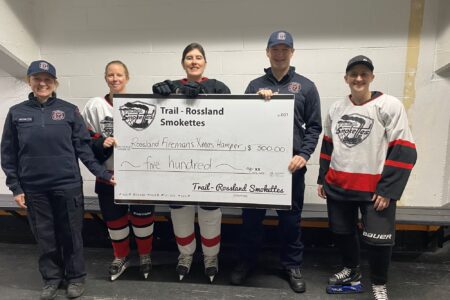Civil Suit Alleges B.C. Blacklisting Forestry Consultant Who Warned of Timber Overcutting, Faulty Data
This article is by Judith Lavoie, and is from DeSmog Canada
Forestry has been a passion and a career for Martin Watts for 25 years, but, since attempting to point out problems with B.C.’s process for setting logging rates, his forestry consulting business has nosedived and Watts is claiming in a civil suit that he was blacklisted by the provincial government.
“My business doesn’t really exist any more except on paper. It has caused a lot of hardship. I am funding this case through my retirement savings,” Watts said in an interview with DeSmog Canada.
However, the battle is worthwhile because it is vital that the public be made aware of inaccuracies in the Timber Supply Review Process, which is used by the Chief Forester to determine the Annual Allowable Cut — a calculation of how much of the forest can be cut each year, said Watts.
Corrupted data and unvalidated computer models are being used to estimate how much timber is in B.C.’s forests and, since budget and staff cuts started in 2002, many of the inventories are 20 years old, according to critics.
It is likely some provincial forests are being overcut, said Watts, adding that some companies cannot find the wood allocated to them so are cutting into previously protected areas or close to provincial parks in an effort to meet their quota.
Overcutting is compounded by the uncertainties of climate change and the pine beetle infestation and some districts are now asking for the annual allowable cut to be reviewed, he said.
Watts Warned of Inaccurate Data
Watts’ company, FORCOMP Forestry Consulting Ltd., specialized in analyzing forest data and carbon offset projects for public and private sector clients and relied on obtaining accurate information about the forests from the province.
But, after Watts complained about systemic shortcomings he found that government contracts were written in ways that excluded him from bidding on them.
His concerns were dismissed by four provincial employees, who are named in the civil suit, and Watts found he was not able to access provincial data he needed for private sector consulting contracts.
Problems began in 2003 when Watts told the Forest Analysis and Inventory Branch that data the branch was providing was not accurate and the errors were affecting estimates of timber volumes, according to the statement of claim submitted to the court.
“From that time in 2003 on, the Defendants took all steps available to them to blacklist FORCOMP and Watts and to detrimentally affect and interfere with the Plaintiffs’ business and economic interests,” it says.
The province is asking for the case to be dismissed and the application emphasizes that government can hire whoever they believe is most qualified to perform consultancy services.
“The Charter claim seems to be that the province must hire persons who consider themselves to be vocal mavericks to perform services, at public expense. The province submits that this is not a cause of action,” according to the province’s application for dismissal.
A B.C. Supreme Court hearing was held Thursday to decide whether the case will proceed or be dismissed and a decision will be made in late June.
Vivian Thomas, spokeswoman for the Ministry of Forests, Lands and Natural Resource Operations, said the province does not comment on cases that are before the courts and Chief Forester Diane Nicholls was not available to comment on the accuracy of the Timber Supply Review Process.
However, Nicholls previously spoke to Focus Magazine and said: “The people of B.C. can have complete confidence in Annual Allowable Cut determinations as they are based on robust complex analysis of many factors that pertain to timber supply and other values.”
Similar to Health Firings Scandal, Says Former B.C. Forest Employee
It is not a statement that holds any credence for Anthony Britneff, who has teamed up with Watts to bring attention to questions surrounding the Timber Supply Review process and who compared the alleged blacklisting of Watts to the scandal over the wrongly fired researchers in the Ministry of Health in 2012.
The denigration of professional reputation, false accusations of unauthorized use of government data, denial of access to public data and blacklisting of those who point out inconvenient facts make the two cases similar, Britneff said.
Britneff, who spent 40 years in the B.C. Forest Service, said there is a litany of problems with inventory data and unvalidated forest growth models.
“The bottom line is that our forests are likely being logged excessively fast, compounding the timber supply problems created by the mountain pine beetle and making more severe the socio-economic impact on 140 forestry-dependent communities in the province,” Britneff said.
That is likely to leads to job losses, mill closures and depleted provincial forests, said Britneff, who speculates that the province does not want to hear about unvalidated computer models or improper use of statistics to predict the growth of forest plantations because of historical silos within the ministry and political pressure to maintain the level of logging and create forestry jobs.
“I very much fear for the future of B.C.’s forests. I have been deeply concerned for 15 years,” he said.
“In addition, over-estimation of carbon sequestered on tree plantations means that the government’s claims of progress towards carbon neutrality would be exaggerated and wrong and the taxpayers would be overpaying for carbon offset projects.”
At the heart of the problem is lack of oversight, an absence of communication between foresters on the ground and ministry headquarters in Victoria and the mantra of “professional reliance,” Britneff said.
A new government could take immediate action to change the way timber is assessed, tighten up loopholes in legislation and, as suggested by some critics, appoint an independent Forester General, he suggested.
This article is reposted courtesy of DeSmog Canada.
Editorial Note: speaking with a BC government forester a few years ago in another part of the province, I asked about the forester’s opinion of the Allowable Annual Cut; was it sustainable? He said, no, it was too high to be sustainable, and that other professional foresters shared that view ― but he asked that I not mention his name to anyone in connection with that opinion. This article demonstrates good reason for his reluctance to be identified. — Sara Golling, Editor, Rossland Telegraph
























